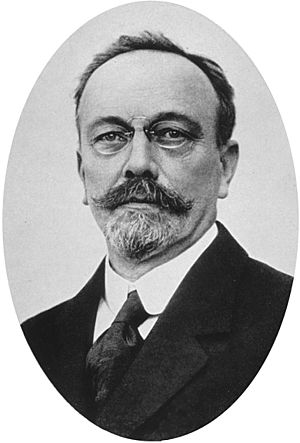Johannes Fibiger facts for kids
Quick facts for kids
Johannes Fibiger
|
|
|---|---|
 |
|
| Born |
Johannes Andreas Grib Fibiger
23 April 1867 Silkeborg, Denmark
|
| Died | 30 January 1928 (aged 60) Copenhagen, Denmark
|
| Alma mater | University of Copenhagen |
| Known for | Induction of cancer using Spiroptera carcinoma |
| Spouse(s) |
Mathilde Fibiger
(m. 1894) |
| Children | 2 |
| Awards | 1926 Nobel Prize in Physiology or Medicine |
| Scientific career | |
| Fields | Medicine Parasitology |
| Institutions | University of Copenhagen Royal Danish Army Medical Corps |
| Author abbrev. (zoology) | Fibiger |
Johannes Andreas Grib Fibiger (born April 23, 1867 – died January 30, 1928) was a Danish doctor and professor. He taught about diseases at the University of Copenhagen.
He won the 1926 Nobel Prize in Physiology or Medicine. He received it for his discovery of a roundworm he called Spiroptera carcinoma. He believed this worm caused stomach cancer in rats and mice.
Later, scientists found out that his conclusion was not quite right. The worms didn't cause cancer directly. The rats actually got sick because they lacked vitamin A.
Even with this correction, Fibiger's work was important. It showed how scientists could try to cause diseases in experiments. This helped others learn more about cancer.
Contents
About Johannes Fibiger
Johannes Fibiger was born in Silkeborg, Denmark. His father was a doctor, and his mother was a writer. He was the second of their two sons.
When Johannes was three, his father passed away. His family then moved to Copenhagen. There, his mother supported them by writing books. She also started the first cooking school in Copenhagen.
Johannes's uncle helped him with his schooling. In 1883, at age 16, he started studying zoology and botany. He went to the University of Copenhagen.
He worked and taught to pay for his studies. He earned his first degree in 1883. Then, he studied medicine and became a doctor in 1890.
After becoming a doctor, he worked in hospitals for a short time. He also studied with famous scientists in Berlin. From 1891 to 1894, he worked at the Department of Bacteriology in Copenhagen.
He joined the Royal Danish Army Medical Corps in 1894. While serving there, he finished his important research on diphtheria. He earned his doctorate degree in 1895.
In 1897, he became a special doctor at the University of Copenhagen. He later became a full professor and director in 1900. He also led the army's medical laboratories.
Fibiger passed away in Copenhagen on January 30, 1928. He had a heart attack.
His Discoveries
Diphtheria Research
Fibiger's early research was about diphtheria. This is a serious bacterial infection. He found better ways to grow the bacteria in a lab.
He also discovered that there were two types of diphtheria bacteria. Each type caused different symptoms. He even created a special blood serum to fight the disease.
One of his experiments in 1898 was very important. He tested his diphtheria serum on many patients. He compared patients who got the serum with those who didn't. This method is now called a clinical trial. It's a key way doctors test new treatments today.
Cancer and Parasite Research
In 1907, Fibiger was studying tuberculosis in lab rats. He found strange growths, called tumors, in some wild rats. These rats had stomach tumors and also tiny worms.
He thought these worms, which are a type of roundworm, might be causing the stomach cancer. After many years of work, he showed in 1913 that he could make healthy rats get stomach tumors using these worms.
He named the worm Spiroptera carcinoma. Later, scientists gave it the correct name, Gongylonema neoplasticum. But Fibiger kept using his original name for it.
Fibiger's work was the first to suggest that parasites could cause cancer. It also showed that cancer could be created in experiments. This was a big step in cancer research.
Other scientists, like Katsusaburo Yamagiwa from Japan, also did important cancer research. Yamagiwa showed that painting coal tar on rabbits' ears could cause cancer. This supported the idea that cancer could be caused by outside factors.
However, after Fibiger passed away, other scientists re-examined his work. They found that the worms he studied did not actually cause cancer. The tumors in his rats were caused by a lack of vitamin A in their diet. Fibiger had mistaken non-cancerous growths for cancer.
Even though his main conclusion about the worms was wrong, his research methods were still very valuable. He helped show how to study diseases in a scientific way.
Personal Life
Johannes Fibiger was married to Mathilde Fibiger. She was his cousin. They got married on August 4, 1894.
He had been sick with colon cancer for some time. About a month after receiving his Nobel Prize, he passed away from a heart attack. He was 60 years old. He left behind his wife and two children.
See also
 In Spanish: Johannes Fibiger para niños
In Spanish: Johannes Fibiger para niños
- Carcinogenic parasite
 | Anna J. Cooper |
 | Mary McLeod Bethune |
 | Lillie Mae Bradford |

